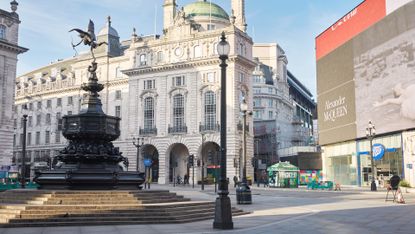‘History may find that lockdowns were a mistake’
Your digest of analysis and commentary from the British and international press

- 1. History may well conclude that the lockdowns were a dreadful mistake
- 2. The truth is many of us have loved lockdown
- 3. With Nicola Sturgeon safe, the battle for the union is back on
- 4. I became the ‘face’ of the Sarah Everard vigil – I’m using my platform to demand change
- 5. These killings can happen because the US celebrates the sale of weapons made for war
1. History may well conclude that the lockdowns were a dreadful mistake
Philip Johnston in The Daily Telegraph
on ‘illiberal’ restrictions
“We have given up a great deal in the past year, and some will rightly point out that many have given up their lives. But above all we have sacrificed that sense of proportion that we once possessed,” says Philip Johnston in The Daily Telegraph. Concerns over the impact of lockdowns on the younger generation have been “borne out” and culture has changed “perhaps irrevocably”, he continues. Enough people are now “so inured to the sense of security offered by lockdowns that they will accept them in other circumstances”. Johnston concludes: “Caution in the face of increased risk is now so embedded in the political and popular culture that it will be hard to abandon.”
Subscribe to The Week
Escape your echo chamber. Get the facts behind the news, plus analysis from multiple perspectives.

Sign up for The Week's Free Newsletters
From our morning news briefing to a weekly Good News Newsletter, get the best of The Week delivered directly to your inbox.
From our morning news briefing to a weekly Good News Newsletter, get the best of The Week delivered directly to your inbox.
2. The truth is many of us have loved lockdown
Alice Thomson in The Times
on the benefits of Covid restrictions
“There is a group of people who have actually become happier in the past 12 months and they aren’t the super-rich sunbathing in the Maldives,” says Alice Thomson in The Times. She points to research that shows more than half of people will miss some aspect of the coronavirus restrictions. Many “have enjoyed slowing down, seeing their families, learning hobbies, consuming less and becoming more flexible”, writes Thomson. “In the week we remember those who died from Covid it may seem strange to talk about happiness, but it’s vital to believe that humanity can ultimately benefit from this tragedy.”
3. With Nicola Sturgeon safe, the battle for the union is back on
Katy Balls in The Guardian
on the fight for Scottish independence
“Down in Westminster, hopes of an SNP implosion are waning,” writes Katy Balls in The Guardian. The issue of Scottish independence has long been one of Boris Johnson’s greatest threats – were he to lose Scotland, he “would probably be done for”, she says. Britain’s vaccine rollout has “drawn some of the sting from the Brexit issue in Scotland” and Sturgeon has had a “bruising” few weeks, but ministers in London have long feared a referendum while Johnson and Sturgeon are in power. “Johnson’s unpopularity compared to Sturgeon’s popularity was viewed as too toxic a combination to consider any such vote,” says Balls. “Whatever May’s election brings, No. 10 is getting battle ready.”
4. I became the ‘face’ of the Sarah Everard vigil – I’m using my platform to demand change
Patsy Stevenson on The Independent
on becoming a voice for women
“I’ve been called ‘terrier-like’, I’ve been labelled as ‘bossy’, or ‘loud’ – well, I am loud. I will continue to be loud,” says Patsy Stevenson, the student arrested at the Clapham Common vigil for Sarah Everard. Writing on The Independent, she says: “It’s been a week since I went to a vigil to light a candle for a woman who I didn’t know, but I related to; simply by being a young woman – and I have now become a voice for every single woman who wants to be heard. I’m not going anywhere and neither should you.”
5. These killings can happen because the US celebrates the sale of weapons made for war
The Washington Post editorial board
on this week’s Colorado shooting
“Once again, families, friends and communities are shattered by devastating loss,” says The Washington Post’s editorial board, referring to the ten people gunned down at a shop in Colorado on Monday. “The why will never be sufficiently answered, so let’s focus on an easier one: How? With an AR-type assault weapon, that’s how,” says the newspaper. The “horror that unfolded” was made possible because the US “allows, indeed even celebrates, the sale of weapons designed for war”, argues the Post. “No surprise, these have become the weapon of choice for mass shooters.”
Create an account with the same email registered to your subscription to unlock access.
Sign up for Today's Best Articles in your inbox
A free daily email with the biggest news stories of the day – and the best features from TheWeek.com
-
 Who actually needs life insurance?
Who actually needs life insurance?The Explainer If you have kids or are worried about passing on debt, the added security may be worth it
By Becca Stanek, The Week US Published
-
 Sexual wellness trends to know, from products and therapies to retreats and hotels
Sexual wellness trends to know, from products and therapies to retreats and hotelsThe Week Recommends Talking about pleasure and sexual health is becoming less taboo
By Theara Coleman, The Week US Published
-
 Is the AI bubble deflating?
Is the AI bubble deflating?Today's Big Question Growing skepticism and high costs prompt reconsideration
By Joel Mathis, The Week US Published